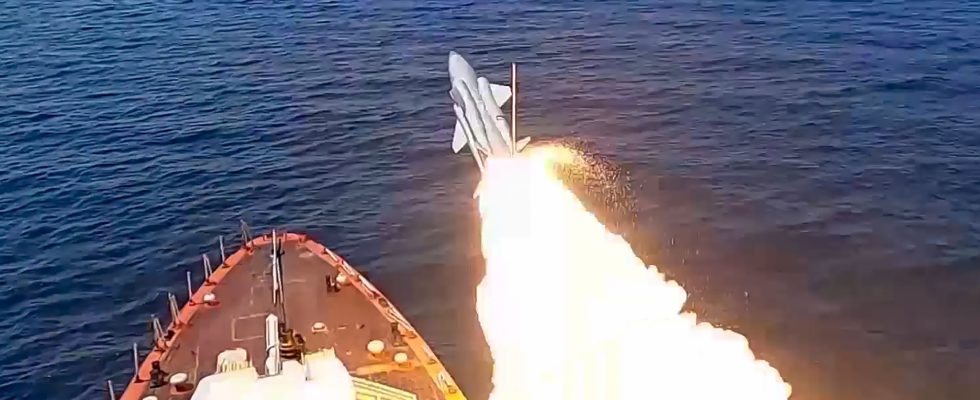Russian strikes continue on Odessa. The grain terminals of this Ukrainian port on the Black Sea coast were targeted by Moscow earlier this week. Rebelote this Sunday, July 23: Ukraine claimed that Russia fired 19 missiles at Odessa overnight, notably causing the “destruction” of an Orthodox cathedral classified by Unesco. These strikes left two dead and 22 injured, according to a provisional report.
A strategic crossroads disputed for centuries and a contact zone between rival powers, the Black Sea has been experiencing renewed tension for a few days. Kiev accuses Moscow of specifically targeting port infrastructure to prevent a possible resumption of Ukrainian grain exports, while the agreement concerning them, negotiated last summer under the aegis of Turkey and the UN, was not renewed by Russia. It allowed freighters loaded with agricultural products to leave Ukrainian ports through protected sea lanes.
“This agreement seems more important for Ukraine than for Russia, which is developing other routes, notes L’Express Jean-Sylvestre Mongrenier, doctor of geopolitics and associate researcher at the Thomas More Institute. As a result, Moscow can use it to try to weaken Ukraine and force the West to relax the sanctions regime. “
“Asphyxiate Ukraine”
As a sign of this resurgence of tensions, a military “exercise” was conducted by Russian forces in the Black Sea, Moscow announced on Friday July 21. According to the Russian Defense Ministry, ships of the Black Sea Fleet fired anti-ship cruise missiles “at a target boat in the combat training area in the northwestern part of the Black Sea”.
In addition, since Thursday, Moscow considers ships going to Ukraine through this stretch of water as “potential military boats”. “The flag countries of these vessels [sont] considered as stakeholders in the conflict”, specified the Ministry of Defense. These threats establish, in fact, a blockade. For Russia, it is a question of “asphyxiating Ukraine and achieving the material conditions for a hypothetical victory”, believes Jean-Sylvestre Mongrenier. “It is a logic of total war which is unfolding, however constrained by Russian deficiencies”, he adds.
The Black Sea, “economic lung” of Ukraine
To achieve its objectives, Russia therefore relies particularly on this maritime space. kyiv, excluded from this almost closed sea six times smaller than the Mediterranean Sea, would therefore be deprived of access to the latter. And would thus find themselves isolated. “Without a maritime opening and access to the World Ocean, Ukraine would be a ‘rump state’ (Editor’s note: a once considerable state, left with a reduced territory in particular following an annexation or an occupation), geographically landlocked”, indicates Jean-Sylvestre Mongrenier.
Besides, as recalled in April 2022 on Sightings Louis le Hardÿ de Beaulieu, professor at the Catholic University of Louvain, Belgium, “the four largest gas fields in the northern Black Sea are located under the Ukrainian continental shelf, east of Crimea”. “Landlocking Ukraine would also be a way of depriving it both of a source of precious energy supply, of financial income and of a possibility of offering other states a partial alternative to Russian gas”, explained the honorary president of the Royal Naval Academy of Belgium.
“The Black Sea is the economic lung of Ukraine: it is through this area that the country exports a lot. This sea is also important for Russia, which is a major exporter of cereals”, underlines to L’Express General Dominique Trinquand, military expert and former head of the French mission to the UN. To these economic considerations is added a military interest. For Moscow, Crimea and Sevastopol in particular, home port of the Russian Black Sea Fleet, “are essential for the Russian Navy”, he also recalls.
In 2014, “the capture of Crimea changed the regional balance. This strategic pivot enabled Russia to strengthen its military presence in the Black Sea and in the Pontico-Mediterranean whole (Black Sea and Eastern Mediterranean)”, noted in 2021 Jean-Sylvestre Mongrenier on the site Desk Russia. “We can consider that the war against Georgia in 2008 was a first step in the restoration of Moscow’s strategic positions in the Black Sea. But the annexation of Crimea is the decisive step”, also explained in 2017 the authors of a note from the Foundation for Strategic Research (FRS).
“Transforming the Black Sea into the Russian Sea”
Moscow would therefore aim “to transform, as much as possible, the Black Sea into the Russian Sea”, advances Jean-Sylvestre Mongrenier, and to make it “a kind of pool clause closed, completely locked by the Russian army”. Intentions that the thinking heads of the Kremlin are struggling to materialize: “they do not really have the naval means”, specifies the doctor in geopolitics.
“Russia has already succeeded in turning the Sea of Azov into a pool clause, recalls Dominique Trinquand. In the Black Sea, it is unlikely to succeed in the same operation, but it can still pose many threats.”
According to Louis le Hardÿ de Beaulieu, the Black Sea “also constitutes an issue that is undoubtedly a little neglected in the structuring of international relations in the region in the aftermath of the conflict”. Jean-Sylvestre Mongrenier agrees: “This is a major issue from the point of view of freedom of navigation and world food security, and even of the balance of forces to be established in this area to preserve the security of the Ukrainian coasts and waters after the war. “
